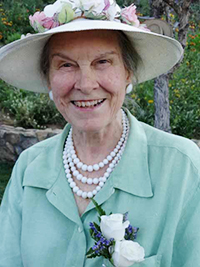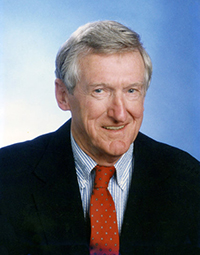NEWSLETTER
|
In Memoriam Winter 2016-17
She started work at the Foundation in 1971 when she was hired as an investment research librarian and, two years later, was named Government Research Coordinator in the office of the treasurer. She was then a research coordinator and social responsibility analyst for investments until her retirement in 1989.
Ms. Camper-Titsingh was born in The Netherlands and escaped with her parents at the outbreak of World War II, settling in Santa Monica, Calif. She received a master’s degree from Columbia University before going to work at Ford.
For more than 20 years she worked on “a labor of love”, research into the life of an ancestor in Europe that culminated in 2010 in a historical novel, The Man Who Kow-Towed, the story of an ancestor, Isaac Titsingh, an eighteenth-century merchant-scholar from Holland.
“How much can one know about the events and emotions during the private life of an obscure, long-dead adventurous man who lived during the eighteenth century?” she asked in an author’s note. “Exploring his life must occur through speculation, projection and inference. I have taken much license in this story….
“This work of fiction should not be taken as an accurate biographical and historical account….this story is homage to the spirit and actions of a remarkable man and the extraordinary times in which he lived: ‘The Age of Enlightenment’.”
Among the comments on the book is one that describes it as a “rich, historical account of the dawn of globalization….Her novel draws considerably on information about the experiences of other eighteenth- century traders and the wide-ranging historical events and cultural changes during Titsingh’s lifetime (1745-1812).”
It is “an inspired adventure for fans of historical fiction”.
Mr. Dunbar, born in West Virginia, was an integral member of a group of white activists who helped shepherd the civil rights movement that emerged in the 1950s.
“They were all polite,” said Taylor Branch, a civil rights historian and author of several books on the struggle, quoted in The New York Times, “a little beleaguered and conscious of the limitations they were up against. “Les Dunbar was quiet, kind of like a non- evangelical preacher. But his personality was suited to his mission.”
That mission included a three-year period of work beginning in 1981 at the Ford Foundation as a senior project associate for social welfare policy during which he published a report, Minority Rights: What Has Happened to Blacks, Hispanics, American Indians and Other Minorities in the Eighties.
Mr. Dunbar left a business and academic career to work in the civil rights movement. He had a master’s degree and a Ph.D. from Cornell University and taught at Emory University before taking a job as head of community affairs at the Atomic Energy Commission heavy water plant in Aiken, S.C. He was teaching at Mount Holyoke College in Massachusetts when he left in 1958 to join the staff of the Southern Regional Council (SRC) in Atlanta.
He saw the South and its legacy of racism clearly.
“The region,” he said, “has been the place where American error and excess go to retire. The most enormous of all, Negro enslavement and peonage, came here to live out its suffering.”
Before he arrived at the SRC “it was a pretty cautious organization, not quick to condemn segregation outright,” Jacqueline Dowd Hall, a history professor at the University of North Carolina who worked at the SRC after he left, told The Times. “I think Les really connected it to the grass-roots civil-rights movement as it gained momentum.”
His influence was considered crucial to the creation and development of the Voter Education Project (VEP), whose goal was to register Black voters in the South, as he worked with Martin Luther King, Jr., of the Southern Christian Leadership Conference and Roy Wilkins, president of the National Association for the Advancement of Colored People.
The voting rights movement led to the Voting Rights Act of 1965, and Mr. Dunbar was present at the law’s signing in the White House.
“He oiled the gears to make the VEP come together,” said T. Evan Faulkenbury, a history professor at the State University of New York College at Cortland. “He talked to philanthropists up north and Robert F. Kennedy’s Justice Department to create the tax conditions under which it could exist, to have tax-exempt money go to voter registration,” he told The Times.
Mr. Dunbar made significant contributions to the broad civil rights movement when he moved to New York City to run the Field Foundation in 1965 and, for 15 years, funded such organizations as the Poor People’s Campaign, the Children’s Defense Fund, the Head Start program in Mississippi and the Food Research and Action Center.
Vernon Jordan, a black civil rights leader who had worked with Mr. Dunbar at the SRC, told The Times, “In those days they didn’t call white people civil-rights leaders. But Leslie Dunbar was a civil-rights leader. He was one of us.”
Matthew J. Cullen, Jr., an independent consultant in planning and management who worked for the Ford Foundation as a program associate in the public affairs, international affairs and education offices, died in September in Blue Hill, Maine.
He was 93.
Mr. Cullen, an honors graduate of Harvard University with a law degree from George Washington University, had a long and varied career in academia, politics and philanthropy.
He was staff assistant to the Budget Director in the Truman administration; legislative assistant to Sen. Henry Jackson, Democrat of Washington; active in the presidential campaigns of Adlai Stevenson; deputy floor manager of the 1960 Democratic convention; and chosen by President Kennedy to be his deputy director for what would have been the president’s 1964 re-election campaign.
He also had been Vice Chancellor of the State University of New York and, on loan from Ford in 1960, Director of Scientific and Technical Manpower at the Organization for Economic Cooperation, in Paris.
In the 1980s he became president of the Hartford Graduate Center, a branch of Rensselaer Polytechnic Institute offering instruction in engineering, science and management, and while its head established one of the country’s first programs designed to improve the management of non-profit organizations.
He is survived by three sons and a daughter. His wife, Julie, and a second daughter pre-deceased him.
|



